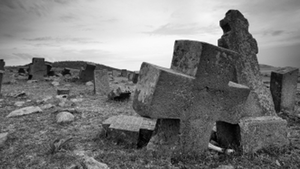Harold Harker ponders life's difficult questions and finds hope.
My father passed away a few months ago. He was 98, had lived a good, long life and had a clear mind to the day he died.
I learned many things from my father. From the time I can remember, he loved growing fruit and vegetables and, later in life, flowers. Anybody who visited our farm never left without taking home a box of produce, and many were the times when visitors shared a meal in our home.
My father had a very friendly nature and he was a great conversationalist. He entertained people with his jokes. In his later years, I sent him jokes I found on the internet. I later learned that he shared many of them with the people he met.
He enjoyed life despite the difficulties that came his way. Major back problems meant he had to use a full body brace for some time after receiving traction in hospital. Yet, he always brightened the lives of those around him.
I felt a huge void in my life when he passed away. And, like most people in such times, I needed to explore some of the big questions of life, death and the hereafter.
![]() Death As A Sleep
Death As A Sleep
One of the things my father passed on to me was a love of Scripture. After he died, concepts from the Bible became even more meaningful as I pondered them, desperate to find answers to my questions about life.
That’s when I discovered that the words of Jesus have deep meaning. A few days after receiving a message that His friend Lazarus was gravely ill, Jesus said, “Our friend Lazarus has fallen asleep; but I am going there to wake him up” (John 11:11).
Thinking that Lazarus had simply fallen asleep, the disciples said, “Lord, if he sleeps, he will get better” (verse 12).
However, the Bible tells us, “Jesus had been speaking of [Lazarus’s] death, but his disciples thought he meant natural sleep. So then [Jesus] told them plainly, ‘Lazarus is dead’ ” (verses 13, 14).
Thus, Jesus made it perfectly clear that death is just like a sleep—no more pain, no more worries, just deep unconsciousness.
The Bible goes further, declaring in unequivocal language, “For the living know that they will die, but the dead know nothing; they have no further reward, and even the memory of them is forgotten. Their love, their hate and their jealousy have long since vanished” (Ecclesiastes 9:5, 6).
Then there are these verses from Job: “If a man dies, will he live again? All the days of my hard service I will wait for my renewal to come. . . . If his sons are honoured, he does not know it; if they are brought low, he does not see it” (Job 14:14, 21).
David, a man after God’s own heart, made the same point. He said, “It is not the dead who praise the Lord, those who go down to silence” (Psalm 115:17).
Thus, those who have died are not—cannot be—praising God because they are asleep.
Not Yet Heaven
Many like to sentimentally think of their departed loved one as looking down on them from heaven, so it may seem surprising that I find comfort in the idea that my father knows nothing of earthly happenings since he died.
In fact, wouldn’t it be horrible for those who have died to know that the loved ones they left behind were suffering with terminal cancer or had been involved in some horrific tragedy? Heaven cannot be heaven when those living in it know about all the tragedies, sickness and death going on in this world.
That is why I am so thankful that death is clearly portrayed in the Bible as total rest—a deep sleep—with no knowledge of the happenings of this world.
At the same time, there are many passages in Scripture that bring me comfort, assurance and hope. Jesus said, “I am the resurrection and the life. He who believes in me will live, even though he dies” (John 11:25).
Paul’s clear logic is also a blessing: “For as in Adam all die, so in Christ all will be made alive” (1 Corinthians 15:22). These words promise that a time of renewal, of new life, is coming. And Paul described that Christ’s second coming will happen “in a flash, in the twinkling of an eye, at the last trumpet. For the trumpet will sound, the dead will be raised imperishable, and we will be changed” (verse 52).
So my comfort lies in the knowledge that my father sleeps and awaits that “great gettin’ up mornin’.”
It’s a promise that has been set in stone. There are no mights or maybes. The Bible states clearly, “For the Lord himself will come down from heaven, with a loud command, with the voice of the archangel and with the trumpet call of God, and the dead in Christ will rise first” (1 Thessalonians 4:16).
It’s a great assurance and a rich promise of life for all who accept Jesus Christ as their Lord.
That Great Day
When we search the Bible, we can find the hope outlined by King David, by the apostle Paul and by Jesus. It gives comfort when death snatches away a loved one.
We all have the opportunity of a bright future with Jesus. Here’s the apostle John’s grand vision of Christ’s return: “And I heard a loud voice from the throne saying, ‘Now the dwelling of God is with men, and he will live with them. They will be his people, and God himself will be with them and be their God. He will wipe every tear from their eyes. There will be no more death or mourning or crying or pain, for the old order of things has passed away’ ” (Revelation 21:3, 4).
I’m looking forward to that great day. I want to see my father; but most of all, I want to see Jesus and thank Him for making all of this possible—for giving me hope, assurance and peace, knowing that my father is resting in sleep and that the next thing his eyes will see is Jesus when He comes again.





